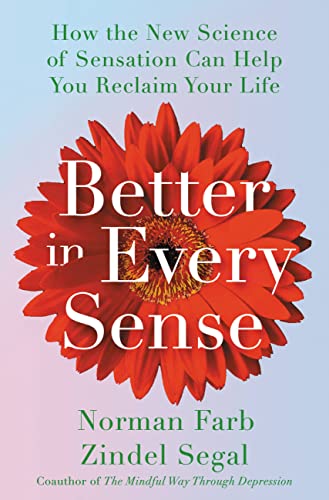What do you think?
Rate this book


259 pages, Kindle Edition
Published January 23, 2024
.1.Прислухайтеся до відчуттів. Вчіться чути тіло, оцінюйте свій стан, спираючись на потік сенсорної інформації, а не висновки, зроблені згодом..
2. Не забувайте про відчуття серед гамору повсякдення. Прислухайтеся до себе не лише в тиші й спокої, а й серед суєти буденних клопотів — ідучи людною вулицею, відчуйте свої ноги, подув вітру на щоках, придивіться до облич людей, вслухайтеся у гомін їхніх голосів, навіть якщо у вас безліч справ. Але головне: виробіть звичку зважати на відчуття в тілі, бо це цеглини, з яких формуються емоції, а ті переростають в емоційні стани.
3. Вчіться розпізнавати відчуття. Насамперед, відчуття застрягання. У ньому мало приємного, але воно надто добре знайоме багатьом із нас. Щоб вийти з глухого кута, потрібно зрозуміти, що ви в нього втрапили.
4. Опинившись у глухому куті, шукайте чуттєвої поживи. Кажуть, єдина незмінна річ у світі — це зміни, однак у стані стресу ми про це забуваємо. Сенсорна інформація нагадує нам, що світ динамічний, живий і мінливий. Навіть відчуття у нашому власному тілі плинні — просто зараз ви вгрузли. У стресі чи глухому куті вчіться налаштовуватися на зміни у світі навколо і всередині вас самих.
5. Пам’ятайте, що відчуття динамічні і складаються з міріадів обертонів. Навчившись розрізняти, як клацають, потріскують і поскрипують ваші відчуття, ви триматимете їх у фокусі навіть у стані стресу. Чуттєвий світ розмаїтий: іноді нам хочеться взаємодії, а іноді ми її уникаємо; деякі відчуття цілком нейтральні, і з ними не треба нічого робити. Чи вдається вам помічати цю багатоманітність, розуміти, що забуксувало тільки одне з відчуттів, але це далеко не єдиний спосіб контактувати зі світом? Існує так багато інших доріг, достатньо просто почути себе.
6. Шукайте поживи у різних місцях. Деякі відчуття рідко спадають нам на думку. Чому б не роздивитися товари в продуктовому магазині? Позаглядайте в кошики інших покупців. Стоячи на касі, спробуйте вгадати, в якому настрої касир/ка. Перетворіть це на гру, вивчайте ту частину повсякденного досвіду, якій ми не надаємо значення.
7. Призвичайте себе до пошуку поживи. З часом ваші дії стануть більш осмисленими, ви навчитеся бачити патерни. Помітивши, що загрузли, поринайте у відчуття. Сплануйте, де й коли вирушити на пошук поживи, і, що найважливіше — таки зробіть це, навіть якщо воно здаватиметься вам дивним чи дурним, бо нерідко ці відчуття вказують на те, що ви на правильному шляху!
8. Визначтеся з точкою входу. Не наслідуйте інших, бо всім підходить різне. Скористайтеся пропозиціями з восьмого розділу або придумайте щось своє: можливо, у вас уже є улюблена справа, яка могла б стати джерелом пошуку чуттєвої поживи. У кожної людини є кілька перевірених часом рецептів; у того, хто вчиться гнучкості, має бути декілька точок входу. Якісь із них принесуть відчуття полегшення, інші сприятимуть появі інсайтів, у декотрих є додаткові переваги: групові заняття покращують взаємодію з іншими, а фітнес зміцнює здоров’я.
9. Перемикайтеся. Не можна шукати тільки полегшення, бо проблеми назбируватимуться. Це нормальний запит у стані перенапруження, але варто щотижня знаходити час для пошуку поживи заради інсайтів, бо саме проактивний підхід розв’язує проблеми, так виникає мить «еврики», а короткочасні втечі лише відстрочують неминуче вигорання. Випробуйте різні варіанти; якщо відчуття застрягання не минає, пробуйте ще і ще. Перемикайтеся між двома режимами, пам’ятайте про свої пріоритети, проте водночас користуйтеся пошуком поживи, щоб перепочити, стати відкритими і гнучкими.
10. Думайте про загальний план. Призвичаївшись до пошуку поживи і навчившись перемикатися, можна подумати про щось більше, ніж виживання. Ми прибираємо сміття, бо воно нам огидне, чи заради того, аби жити в чистішому світі? Це ще одна форма перемикання, тож коли у вас є на це ресурс, запитайте себе: чи готовий/а я перейти в іншу лігу? Мати справу з серйознішими викликами? Навіть якщо відповідь заперечна, можливо, ви все одно дозріли до чогось вагомішого.